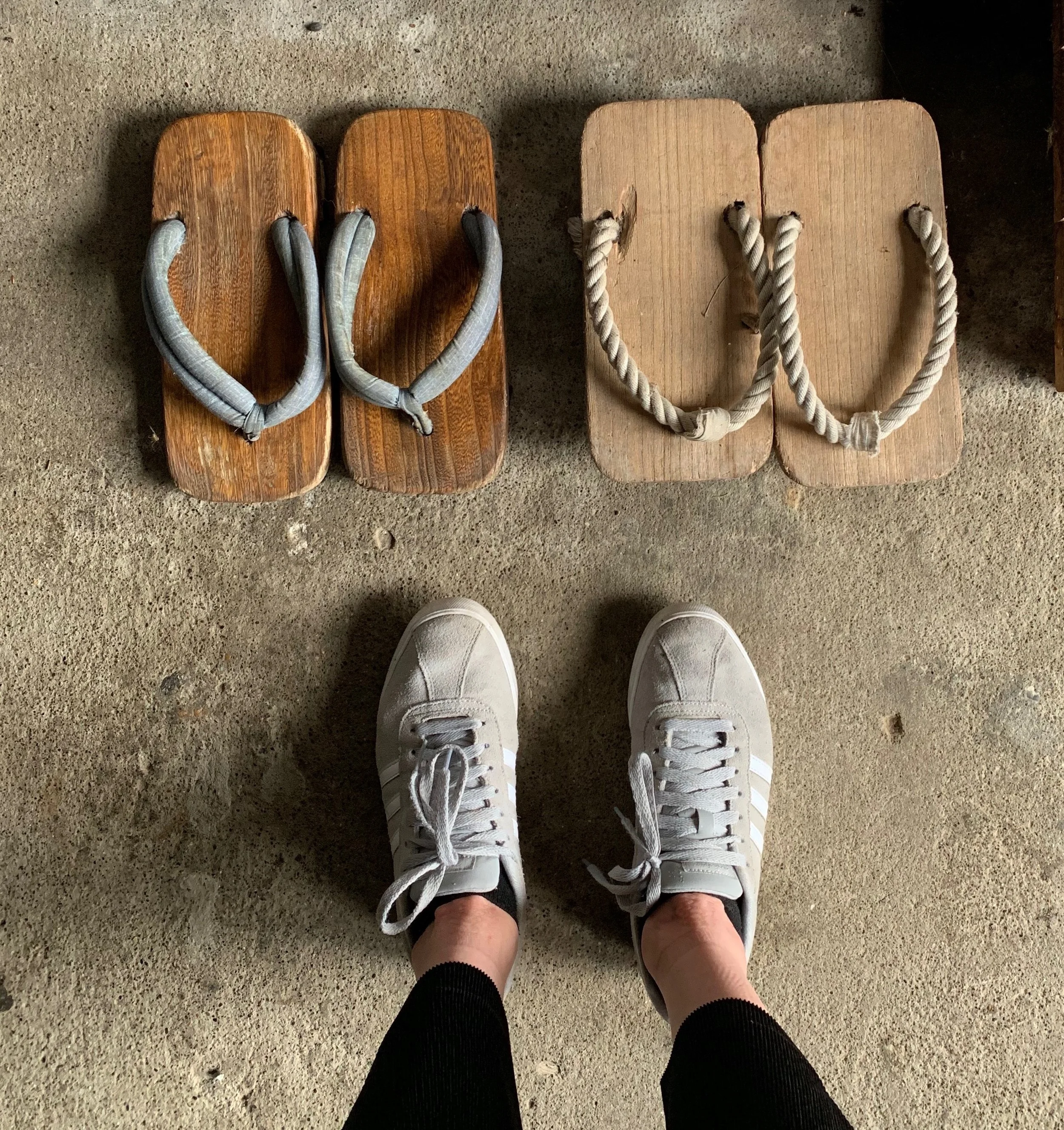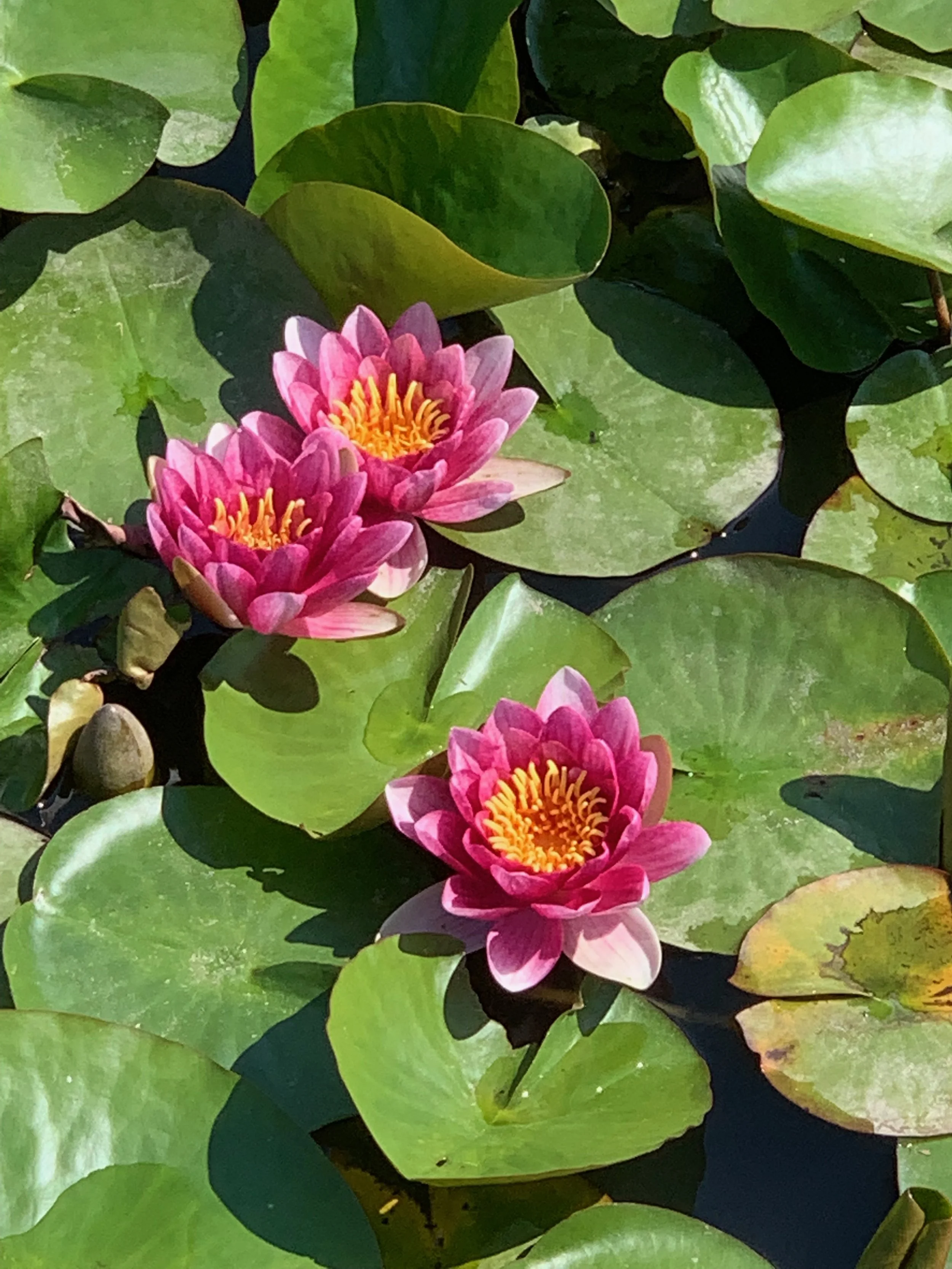It feels like day 813205 of the lock-down. It's rainy. I am not feeling that great. And that's OK.
Sometimes, I try to justify all of this madness by thinking of all the good things coming out of it. I am practicing a lot. Becoming closer to friends and family who live far away. And—because of my niece's obsession with a psycho-socialite that teaches killer workouts—I may even end up with a soupcon of abs for the first time in my life.
But staying positive all the time can feel exhausting. On those moments, I need to let go. To understand shit happens, and there is no need to justify it. To eat pancakes for dinner. To take a day off Zoom and listen to my worries, my anger, my grief. To hold space for these feelings that are often overwhelming, often enlightening.
Because balance is only found in that tiny space that lies between our joy and our grief, our hopes and fears, our OKness, and not OKness. Without darkness, there is no light.
Love,
Nathalie
My team at the uni. We loved taking pics in black and white because it felt more artsy ;-)
When I was in university, one of my teachers decided to make a deal with the whole class: he would not fail any of us as long as we did the assignments.
The class was on TV and cinema production. The fact that we could not fail didn't make us lazy or careless. On the contrary, it gave us the freedom to take risks and explore themes we would have never considered if we had to be concerned with grades. I remember writing absurd scripts, creating surreal backgrounds from scratch, and learning how to make TV blood (ketchup with grenadine). As a team, we came together without fights. We even figured out how to fake the explosion of a car. We had fun. We also made tons of mistakes, but we learned from them, and those lessons served us well for the rest of our lives.
However, every day of my life, I am a little afraid of failing: of saying the wrong things, giving a half-ass Reiki session, or running out of money when I am old. It's not just me—I see it all around me, constant worry. People are afraid of losing their jobs, of not being good enough, of not being loved.
What if we could do the same in life that my teacher did in class: permit ourselves never to fail. Take the pressure off every decision we make. Understand that if we quit our job, there will always be another one. If we had a fight, we could always reach out. That even if we become who we always wanted to be only for a minute, the rest of our life is not a failure—it's just what we needed to get to those glorious 60 seconds.
A difficult task, and one I am working hard on by meditating and doing healing sessions—but most importantly, by reminding myself constantly that life is an exploration, an adventure, and I can't fail at it. That success is what I define.
When trying to fit in is difficult.
For most of my life, I felt like I didn’t belong—in a country, a job, or even in my family.
I’ve been a foreigner since I left Belgium at eight. Living in Venezuela meant growing up with the Spanish side of my family: ultra smart but more interested in business than art or philosophy. When I was 13, I used to scare the hell out of them by asking, “What are we going to do? Capitalism doesn’t work! Neither does communism! There is no viable economic system!” Or… “Where does the universe end? Is there anything beyond it?” (I gave up on the former but still wonder about the later one.)
Moving to New York was awesome. It gave me the freedom to be whoever I wanted but did little to improve my sense of belonging. We were all drifters.
A few years into my Reiki practice, however, while deep in meditation or offering a session, a sense of connection and wellbeing would settle over me and the words “I am home" would pop into my head.
Home in my own body and mind, but connected to everyone and everything.
A fleeting feeling, it’s true. But a feeling that has given me a sense of belonging anchored in myself, not in temporary situations, relations or possessions. A feeling that allows me to let go of the need to define who I am to others and even myself.
Now when my family thinks I am a Hare Krishna who goes around New York with a begging bowl singing “hare, hare,” because I meditate, I smile. (This is not a joke, they actually do.)
What makes you feel like you are “home”? What gives you a sense of safety and warmth? I would love to hear about it!
Love and light,
Nathalie
Every Sunday evening, I teach a Reiki + Meditation community class at YES, a lovely yoga studio in Ridgewood. It’s one of the highlights of my week. Most of the attendants are young, joyful, and very chatty. As soon as the class starts, however, they go quiet and put on a solemn, “peaceful” expression. It’s too tempting. I make them do the silliest of shakeouts. Regulars now do it laughing, but every week I see the newbies giving me the side eye while thinking, “Is this a joke? Is she for real?” Until we really start... and they discover the class is not about easy guided meditations or Reiki sparkles. By the end of the class, their eyes open in wonder about how good they feel.
Joy is often misunderstood as lack of seriousness or depth when it comes to Western spirituality, probably the influence of more Judeo-Christian approaches. Yet—when we go back to Buddhism—joy is the fourth factor of awakening, just behind energy.
Joko-san, the abbot of the meditation hall in Japan where I spent three weeks, kept repeating every time he saw: “just enjoy breathing, enjoy!” In other words: just breathe, clear your mind from anger and fear, and learn how to embody joy. For yourself and others. And if that sounds pretty much like the Reiki precepts, it’s not a coincidence: Buddhism is one of the roots of Reiki practice.
A few days ago, I spent a whole week with my teacher and mentor Frans Stiene. He is a very joyful teacher. He makes jokes all the time, dances, sings, pokes fun at the shy students. He’s never ashamed of being silly. But he is also one of the Reiki teachers with more knowledge, depth, and compassionate energy I’ve met. Joy makes his teaching approachable. It also makes it easy to sit for hours of training and feel safe to ask the most absurd questions.
Frans many times has said that to offer Reiki, you need to overflow with the energy. That the end goal of the practice is to integrate it into real life. Spreading joy is, in my opinion, a great way to do it.
So, next time you take a meditation class, get a Reiki session, or even a massage, smile and let me know if it made a difference.
Love and light,
Nathalie
I don’t know about you, but my family doesn’t really get the whole Reiki practice thing. My mom, who’s from Spain, thinks it’s some sort of Japanese santeria. She doesn’t say it in so many words, but her not-so-subtle eye-rolling every time I mention Reiki makes it evident. She was visiting me a few days ago, and we started chatting. When I said the word Reiki, boom, there it was: eye rolling.
—But Cotufa—Cotufa or popcorn is my nickname for her—it’s not santeria, it’s just breathing and connecting with your body.
The word breathing caught her attention. She has emphysema.
—What do you mean, breathing?
—Using your breath to align mind and body.
I left out the word energy on purpose to avoid the famous Cotufa eye rolling.
—Breathing into your body? That makes no sense. You can only breathe with your lungs.
—Think of breathing more in terms of awareness. You use your breath to bring your awareness to different parts of your body: hands, feet, skin.
Blank stare.
When we’ve been practicing for a long time, we start using terms like breathe with your whole body or create spaciousness. But these terms sometimes feel very vague and esoteric to people who have not practiced any mindfulness techniques.
In the case of my mom, simple facts caught her attention more than terms like non-duality or balancing energy systems. Her eyes came awake at the idea that they’re 100 million neurons in the gut and that, when you breathe and expand your belly, you relax that area. Or that creating spaciousness could be taken as using your whole nervous system versus just your brain.
I’m not saying that Reiki talk should become all about science. It’s, after all, a beautiful spiritual practice that goes beyond that. But there are many layers to this system. You can practice Joshin Kokyu Ho for years and still discover new depths to this meditation.
Simple, down to earth facts may prove appealing to some. For others, it may make the practice to sterile and be a complete turn off. It is up to us, as teachers to go deep enough into our practice that we can provide the right guidance.
The other day I was reading in The New York Times an article about the impact of positive people. It mentioned that in Japan, women thrive until very old age because most are part of a "Moai,” a social group that forms to provide different kinds of support: social, financial, health, or spiritual.
And it made me think about us, New Yorkers.
Many of us have groups of close friends with whom we eat, party, share adventures, process our breakups, etc. But in a city where we all pride of being independent and fierce, how much emotional and spiritual support do we really take in? How open are we to being vulnerable?
The other day I was offering a Reiki session to one of my clients. It took her a long time to open up and receive energetic support. Once she did, she was able to let go of stress, relax and truly benefit from the session. But her first reaction was resistance.
Receiving support has never been my forte either. I still have to force myself to ask for help. But every time I do it, I’m like, “duh! It was so easy with someone else's help!”
One of the end goals of Reiki practice is to let go of anger and worry. In my experience, it is a lot easier to let go of something when you have the right kind of support. We worry less when we know someone has our back. Anger doesn't have such a firm hold on us when we feel loved, energized and accepted.
No matter how strong or independent, we all are interconnected. Which means that whenever life throws us down, there is a giant energetic net in which we can fall back. It just takes a little of awareness to feel it.
My practice to feel more connected to others:
I add a loving-kindness meditation twist to the Reiki meditation Joshin Kokyu Ho.
- Sit with your back straight. Close your eyes and place your hands in your lap, palms facing upward.
- Inhale and feel the energy coming in through the nose and moving down to the Hara (an energetic point 2 inches below your belly button.)
- Pause, feeling the energy filling your entire body.
- Exhale, expanding the energy out of the body through every pore, creating a big bright sphere of light that surrounds you.
- Repeat steps 3 to 5 as many times as you wish.
- When you have this routine down, bring someone you love into your bubble. It can be a pet or a friend/family member that brings you joy. Notice the difference in your body, especially your heart area.
- After a few breaths, let go of that pet/person and imagine your sphere getting bigger: filling the room, covering the neighborhood, the city, even the whole world. Notice any change in your feelings or body.
- After a few minutes stop the visualization, and sit for a moment in the space you created breathing normally.
Three years ago, I took a sabbatical from advertising to dive deeper into my Reiki practice. It was a priceless experience but one that let me with the certainty that, what I wanted, was to integrate my practice into everyday life.
Back in advertising, I get to practice Do not anger and Do not worry almost everyday. Many other times I get to feel the beauty of Be grateful. But until now, the precept of being compassionate to yourself and others was elusive. Sometimes I would feel compassion for others or for myself (ok, also indulgence.) But the two together? I didn’t even know there was such a thing and that it would feel so different.
So when my boss told me I was to travel to San Francisco for a meeting, I had no idea what was in store for me. I was just thinking, “Yes: Miles!”
My plane was overbooked and given that it was United (skull fracture, anyone?) I was a little worried. Boarding was very peaceful and cordial, if a bit messy. I got to my aisle seat on the last row, just next to the bathroom. Great!
People started to settle next to me. Mostly families with toddlers and babies. Excited. Scared. Screaming. Very, very loud. Not the most auspicious beginning. But it was a short flight: only 6 hours.
Well, not really. The engine had an issue, so we were delayed. And delayed. And delayed.
People were restless. Parents fretted. Toddlers pooped, screamed, cried, and pulled at each other’s hair. A young couple decided to break up next to me while waiting for the bathroom (really, people?). Groups were forming next to me and would hit my shoulder. The dad sitting next to me kept on making me stand up to go and check on his family. Then an “emotional support” dog wasn’t feeling well and the owners were desperate trying to get him to do number 2 in the bathroom, which he did on the floor after hours of stress and just before a woman walking barefoot came in.
The noise. The smell. The pushing.
I just wanted it to stop. I felt like crying and screaming, ‘Why me?’
Sniffing a bit, I put my earbuds on and started doing purifying breath (a Reiki-practice that’s grounding and calming).
And there amidst the chaos, I started to feel peaceful and light.
I was emotionally engineered by my upbringing to be a victim. It’s my default mode. But at that moment it dawned on me: I wasn’t one. We all were struggling. Parents were trying their best to manage their kids. Flight attendants were trying to remain calm and helpful.
We were all in the same boat.
The expression may be trite, but I felt the meaning with my whole body and spirit.
The lightness, warmth and peacefulness that ensued allowed me to survive the flight and, even better, actually enjoy it.
When the twin toddlers in front of me started blocking my screen with their tiny hands in the middle of a movie, I tickled them. Seeing the relief on the mom’s face (who probably was expecting me to scream) was worth missing a few minutes of what I had to admit was a very boring movie.
When the flight attendant brought me the wrong dinner, I just smiled and asked if there was any other choice left. There was and it ended up being complimentary (with United: absolutely flabbergasting).
I do have one confession: I loved when we hit pretty rough turbulence and people remained in their seat.
After almost ten hours in the crowded plane, I landed in San Francisco energized, content and ready for my journey there.
And inspired to keep on exploring the Reiki precept “Be compassionate to yourself and to others.”








